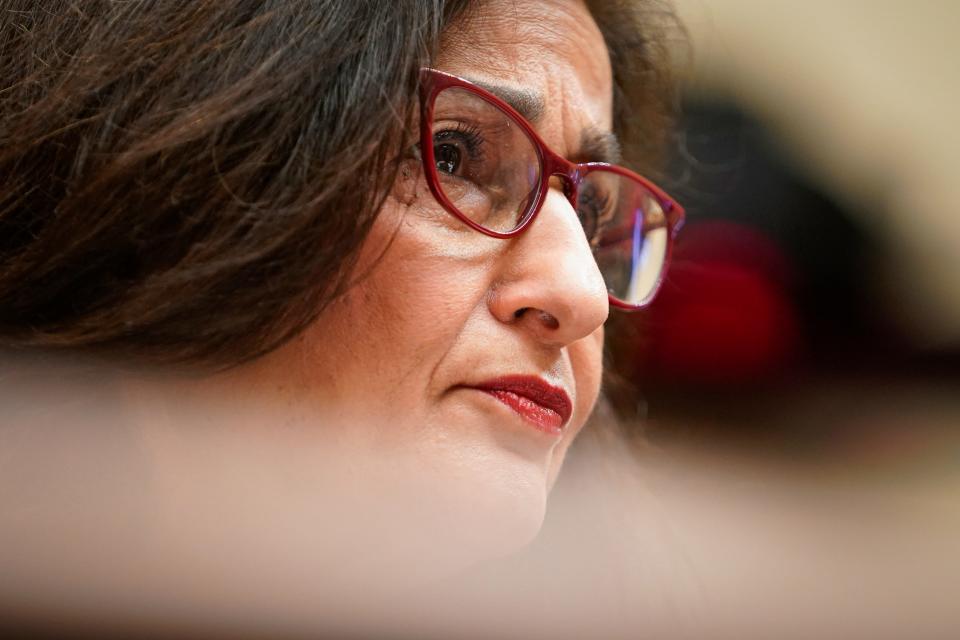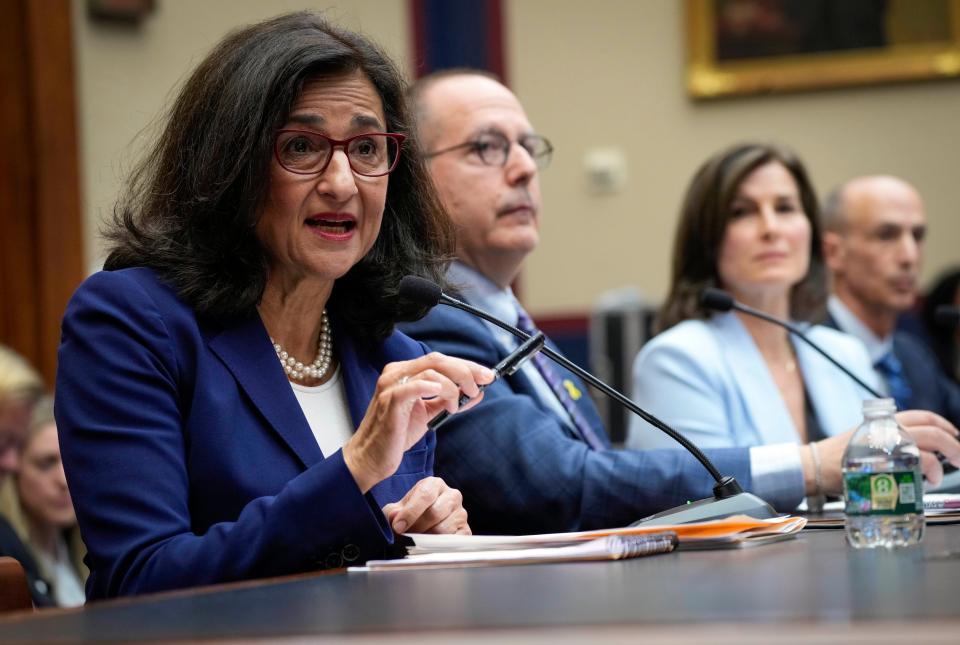Columbia University president fends off questions that took down her Ivy League peers
Last December, Elise Stefanik, a congresswoman from New York and a Trump-aligned star in the Republican party, had a standout political moment.
A line of questioning she posed to the presidents of two Ivy League universities during a congressional hearing drew widespread condemnation of the college leaders who wouldn't say whether calls for the genocide of Jewish people violated school policies. The presidents, Claudine Gay of Harvard and Liz Magill of the University of Pennsylvania, both stepped down from their posts in the aftermath.
Read more: Harvard, Penn and MIT presidents ignite furor with 'unacceptable' response to antisemitism
One Ivy League president wasn’t there. Minouche Shafik, of Columbia University in New York City, was invited to testify before the same panel of lawmakers, but declined to appear at the December hearing because of her travel schedule.
As protests over the Israel-Hamas war have continued to roil her Manhattan campus, congressional Republicans again asked her to testify on Capitol Hill. Her presence in Washington on Wednesday, alongside other university administrators, yielded yet another contentious scene that put campus discrimination under a political microscope.
She seemed to have learned from the mistakes of her Ivy League peers. When Rep. Suzanne Bonamici, an Oregon Democrat, asked whether calling for the genocide of Jewish people would violate Columbia’s rules, she said yes without hesitation. That response stood in stark contrast to the heavily lawyered answers from the leaders of Harvard and the University of Pennsylvania late last year.

“Columbia beats Harvard and UPenn,” said Rep. Aaron Bean, a Florida Republican. “Y’all have done something that they weren’t able to do. You’ve been able to condemn antisemitism without using the phrase ‘it depends on the context.’”
Frustration at the highest ranks of the university’s leadership was on full display Wednesday.
“The antisemitism on our campus makes me sick to my stomach,” David Greenwald, the co-chair of the university’s board of trustees, told lawmakers.
The hearing accentuated the bipartisan scrutiny facing college administrators in Washington, as Jewish and Muslim students across the country have reported fearing for their safety on campuses in recent months. Columbia, like many colleges and universities, is under investigation by the Department of Education’s Office of Civil Rights over allegations of discrimination.
But in the minds of critics, including some congressional Democrats, Wednesday’s hearing was less of a reflection of Republican concerns over the antisemitism students are facing, and more in keeping with a broader campaign of conservative attacks on higher education.
In a statement ahead of the hearing, Irene Mulvey, the president of the American Association of University Professors, said colleges and universities are currently witnessing a “new strain of McCarthyism.”
“Academic freedom, free speech, peaceful protest and associational rights for students and faculty must not be abridged in the name of fighting antisemitism,” she said. “We reject the false ‘choice’ between promoting a healthy and safe campus culture and promoting free inquiry.”
Rep. Bobby Scott, D-Va., criticized Republicans on the committee for failing to acknowledge concerns about the rise of Islamophobia on college campuses as well. As lawmakers’ questioning dragged on Wednesday, pro-Palestinian groups on the Manhattan campus set up an encampment in solidarity with the people of Gaza.

The hearing came a day after a Jewish student sued the university in federal court. The student, who is not named in court documents, said administrators unjustly suspended him for spraying what he called a "non-toxic 'fart spray'" into the air during a pro-Palestinian rally on campus in January.
The chemical caused some students to seek medical treatment, and the New York Police Department launched an investigation. In a January statement, Dennis Mitchell, Columbia's provost, called the incident "deeply troubling" and condemned it in the "strongest possible terms."
Read more: NYPD probing reported chemical attack against students during pro-Palestinian protest at Columbia
Anonymous social media apps under scrutiny
During the hearing, Shafik acknowledged that anonymous messaging apps have played a big role in stoking hate on Columbia’s campus in the months since Oct. 7. She called out one platform in particular.
"Every student I meet, I tell them get off Sidechat,” she said. “It's poisonous.”
Sidechat, a social media app wildly popular among college students, has struggled to handle a spike in hate speech triggered by the conflict in Gaza. On Wednesday, Shafik told lawmakers she would welcome any improvement in content moderation on the app.
“We recognize these are difficult times on campuses and we’re committed to ensuring Sidechat remains a safe environment for students,” the app's cofounder, Sebastian Gil, said in a statement to USA TODAY last month.
Read more: College students love Sidechat. Colleges, not so much.
Cursed by God?
In one head-scratching moment, Rick Allen, a Republican congressman from Georgia, asked Shafik whether she wanted her university to be “cursed by God.”
“Definitely not,” Shafik replied.
The congressman then went on to suggest that administrators at the Ivy League school require students to read the Bible, even though they already do. Most undergraduates have to read parts of the text as part of a mandated series of classes every student must pass to graduate.
The interaction demonstrated the limitations of congressional hearings, which often veer into political theater, in discussing sensitive topics.
Zachary Schermele covers education and breaking news for USA TODAY. You can reach him by email at zschermele@usatoday.com. Follow him on X at @ZachSchermele.
This article originally appeared on USA TODAY: Columbia president Minouche Shafik fends off antisemitism inquiry


